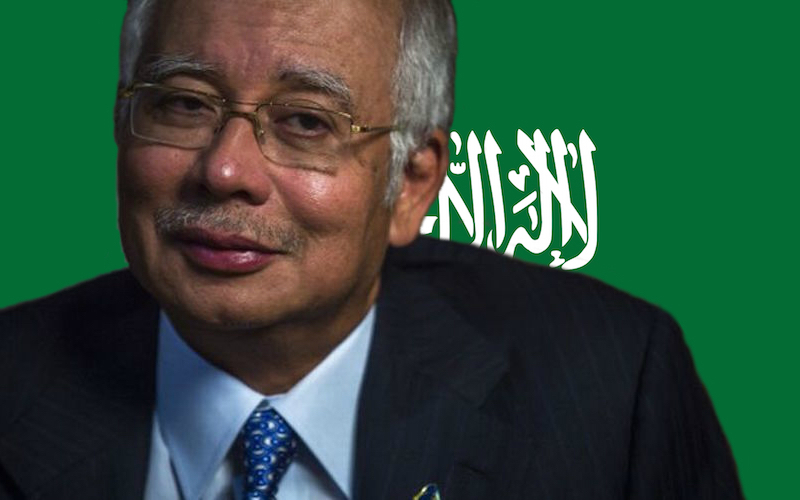
Saudi Arabia, an ASEAN Power?
The Internet was awash on Tuesday with news that Malaysia’s Prime Minister Najib Razak was cleared of graft charges in a financial scandal that had gripped the nation for the better part of 2015. Apandi Ali, the Malaysian Attorney General, concluded that the $680 million under dispute proved to be a personal donation from the Saudi Royal family to Najib. Apandi also found that no other criminal offenses were committed and that his office couldn’t find any evidence that the donation was used as an “inducement or reward” for Najib to undertake certain policies as Prime Minister.
The case dates back to the summer of 2015, when the Wall Street Journal claimed that Najib had used Malaysia’s development fund (1MDB) as a cover to siphon funds for personal and political use – allegations that were refuted in August, when the country’s Anti Corruption Commission (MACC) found that there was no link between the 1MDB and Najib’s account.
While the ruling puts to rest one of the loudest political scandals that ever befell the Southeast Asian nation, a bigger question arises: when, and more importantly, why did Saudi Arabia become such an influential actor in the region?
Playing the sectarian card
If anything, the Saudis are known for their involvement in the sectarian affairs of the Middle East, but nowhere near Malaysia. However, in that role, Riyadh has positioned itself as the leader of the Sunni world, seeking to empower and increase the reach of the Sunni demographic. Much like its oil-dependent economy, Saudi Arabia’s foreign policy is therefore the function of one over-arching element: supporting Sunni nations, through aid, investment, or in Bahrain’s and Yemen’s case, military intervention.
At first sight, the Malaysian Prosecutor’s announcement could sound fickle: the far-flung Kingdom is not known for taking such a personal interest in the affairs of ASEAN countries. Indeed, social media was ablaze with derisive comments as many wondered whether the prosecutor was, in fact, trying to whitewash Najib’s image. However, a cursory look through the history books vindicates his findings.
While Saudi ties to the majority Sunni nation of Malaysia date back to the 70s, it was only under Prime Minister Mahathir Mohamad when the relationship began to evolve from one focused on financial assistance to a diverse economic relationship. Bilateral trade rose three-fold between 2000 and 2013, reaching $3 billion, a modest figure.
It was within this context that the Saudis decided to prop up the ruling UMNO party in the wake of the 2013 general election. According to a Saudi source quoted by the BBC, the donation was authorized by the late King Abduallh and was paid over in several wire transfers between March and April 2013 in a bid to keep the opposition parties associated with the Muslim Brotherhood at bay. The BBC was also quick to point out that the Saudi family has a long history of handing out cash to friendly governments. For example, Jordan, Morocco, Egypt and Sudan have also received billions of dollars from Riyadh’s deep pockets. Malaysia’s donation occurred before Egypt’s overthrow of the Muslim Brotherhood-backed Mohammed Morsi government, at a time when the Saudis were fretting about losing the support of their strategic allies.
The global rise of ISIS along with the simmering spat with Iran’s Shia clerics, has prompted the Saudis to rethink and widen their courtship strategy. Malaysia is a fitting choice, thanks to Najib’s widely praised counter-terrorism efforts and moderate vision of Islam. Even President Barack Obama lauded the country, saying that its voice “is critical in the debate that is taking place internationally around terrorism.”
The Kingdom’s influence doesn’t stop in Kuala Lumpur. In 2014, Saudi Arabia signed a defense cooperation agreement (DCA) with fellow OPEC member Indonesia. The DCA was the first sign that the Kingdom seeks to deepen ties with Sunni Muslim nations from Asia, and a marked evolution in Saudi foreign policy. Bilateral ties amounted to almost 7 billion in 2011. On January 19th, shortly after the Jakarta attacks, the Indonesian Foreign Minister paid a visit to Riyadh, during which both parties expressed their desire to deepen ties.
Saudi Arabia’s bid to draw Southeast Asia under its fold comes at a tricky moment in its ongoing tussle with Iran. With Teheran unshackled from the heavy strain of international sanctions, the country’s leadership has jumped at the opportunity to court European governments. In a recent visit to Italy, the first by an Iranian President in 16 years, Hassan Rouhani was given a warm welcome and signed deals in excess of $18 billion.
After the January 15th Jakarta attacks, Southeast Asia increasingly appears to be transforming into the next battlefront between the Saudis and the Iranians in what has been described as a “war for the soul of Islam” by US Democratic Presidential candidate Bernie Sanders. Najib’s $680 million donation is just the tip of the iceberg.

